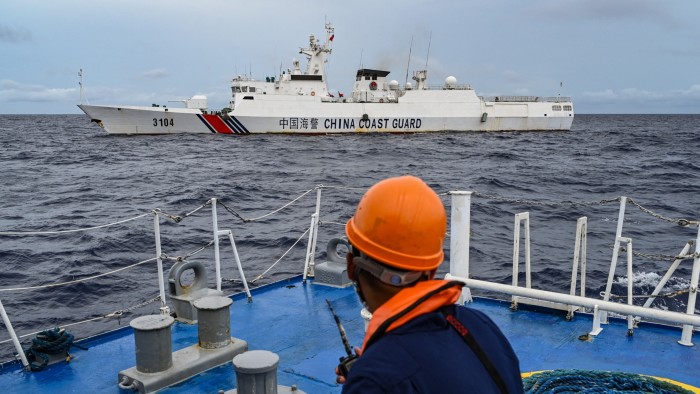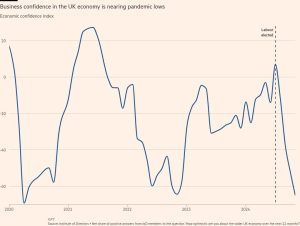Philippines considers new UN case against Beijing over South China Sea activity

Unlock the Editor’s Digest for free
Roula Khalaf, Editor of the FT, selects her favourite stories in this weekly newsletter.
The Philippines is working to build a new arbitration case against China over alleged breaches of international law in the South China Sea and is lobbying other countries to join as it struggles to counter Beijing’s increasingly assertive actions in the disputed waters.
The government of President Ferdinand Marcos Jr is gathering evidence about Chinese violations of the UN Convention on the Law of the Sea eight years after Manila won a first case against Beijing.
The administration wants to file a “foolproof, solid case” against China, Andres Centino, Marcos’s chief adviser on maritime policy, told the Financial Times, adding that his government wanted other countries to take part in the claim.
“We are seeking also more support of the international community, maybe for [other Unclos signatories] to fight the case,” said Centino.
Manila hopes other countries can “stand up against China on behalf of everyone” to hold Beijing accountable for infringing the rights of all Unclos signatories, he added.
The plan highlights Beijing’s growing pressure on Manila in the South China Sea, which has become a geopolitical flashpoint between China and the US.
A 2016 arbitral award found China’s claim over almost the entire South China Sea to be groundless under Unclos. Beijing refused to take part in the arbitration and has rejected the ruling.
Centino said action by a group of countries could increase the chances of enforcing a future ruling.
“The Chinese are doing what they’re doing because they can easily deal with the Philippines,” he said. “If they were dealing with a lot of countries, maybe that would be more forceful.”

China continues to assert its claims in the South China Sea by patrolling and surveying other states’ waters, blocking access to islands and reefs, harassing resource exploration and disrupting fishing, often violently.
After Marcos took office in June 2022, Manila became the most vocal South China Sea claimant decrying Beijing’s actions. But it has struggled to push back against China’s large, well-armed fleet of coastguard, naval and maritime militia ships operating from artificial islands it built and militarised over a decade.
The US has offered to support the Philippines, its oldest ally in Asia, in resupplying a military outpost on Second Thomas Shoal, a reef in Manila’s exclusive economic zone, amid Chinese disruption.
However, Manila has declined out of concern that China would view this as an escalation.
After an attack in June in which the Chinese coastguard boarded Philippine military vessels and a Philippine sailor lost a thumb, the two sides reached a provisional agreement under which Manila has conducted some undisrupted resupply missions to the shoal.
But “China continues doing what they’re doing, even pushing forward”, said Centino. “Inch by inch, they occupy some features.”
“When tension gets high, they pacify everything, and then when things get calm, they [move forward again] until right now [they are] nearing Palawan,” he said, referring to the westernmost large island in the Philippine archipelago.
Manila is now exploring how to build evidence against China. Among the options under consideration are another case challenging Chinese sovereignty claims, an environmental case and a case against China’s use of force against other countries’ vessels.
One option would be to take China to court for destroying fishery resources — to which the Philippines and other coastal states have economic rights — through its reclamation activity.
Manila hopes a UN body or non-governmental groups from countries including Vietnam and Japan can conduct a study to assemble evidence of this.
The Chinese foreign ministry did not respond to a request for comment.
#Philippines #considers #case #Beijing #South #China #Sea #activity




